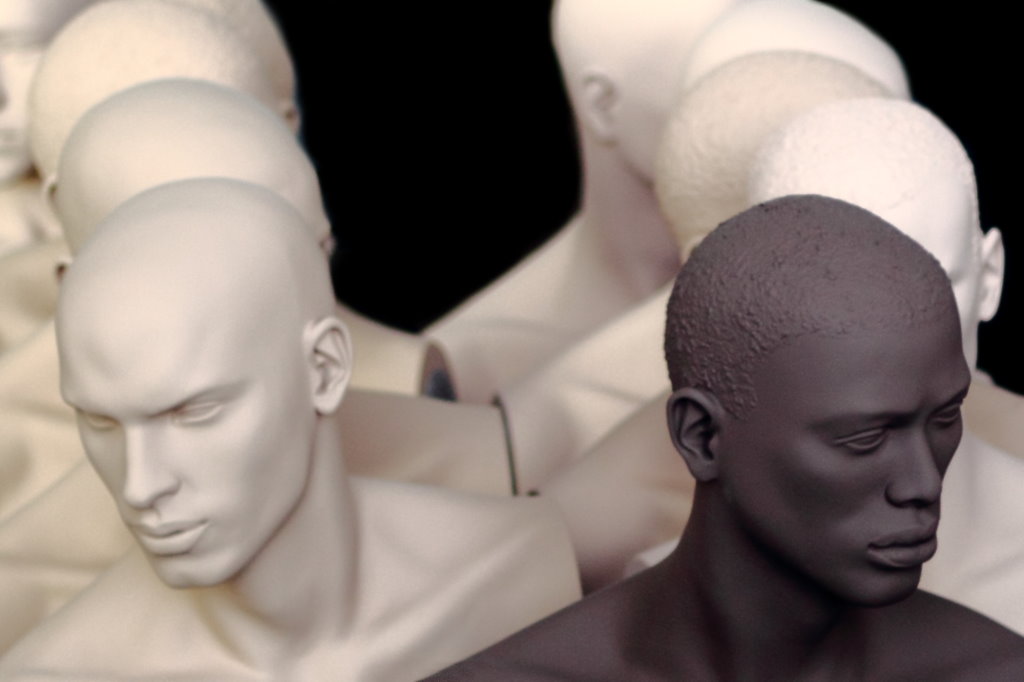

In the wake of massive #BlackLivesMatter demonstrations, the ugly implications of racism in the United States have come to the foreground. Prejudice, whether conscious or unconscious, exists on a much wider scale than most of us would like to admit. In fact, you can glimpse into your own brain and measure its unconscious attitudes toward various objects and ideas by taking an implicit association test, or IAT. (The results might surprise you.)
Virtual reality (VR) might help us overcome these implicit biases, according to a paper recently published in Trends in Cognitive Sciences. Researchers used VR to help people slip into the skin of an avatar and temporarily take on a new identity, cultivating cross-racial empathy along the way.
The study used a variety of optical illusions and technology to hack the brain into thinking the body is something that it’s not. First, the researchers performed the “rubber hand illusion,” in which they stroked a dark-colored dummy hand in sync with a white participant’s real hand, which was hidden from sight. Participants scored higher for egalitarianism on an IAT after the experiment, compared to beforehand.
Scientists also measured the connection people had with their rubber hands by pricking it with a needle, then measuring the amount of sweat on their real hands (like our armpits, our hands tend to sweat when we’re anxious). People who had stronger—and sweatier—associations with their rubber hands also scored a lot more positively on the IAT.

In the second experiment, called the “enfacement illusion,” each test subject was stroked on the face by a cotton swab as he or she watched a video of someone of a different race having their face stroked at the exact same time. After this experience, participants tended to rate their counterpart’s face as more attractive and physically similar to his or her own. They also said they would be more likely to share the person’s opinions.
In the final exercise, women underwent a full-body transformation in virtual reality. They wore wide-angle, high-resolution head-mounted VR displays and motion-capture suits for tracking their bodies in real-time, all to create an immersive experience. Each test subject could see her own hands in the virtual world, as well as a reflection of her avatar body, in pale, dark, or purple shades. White women who spent time in black bodies came out with a more positive IAT score. However, female participants who slipped into pale or purple skin didn’t score any higher after their VR experience.

“These simple illusions manipulate the way the brain uses information from senses like sight and touch. They show how plastic our brain is,” Manos Tsakiris, a co-author of the paper and professor of psychology at the University of London, told Popular Science.
Tsakiris says the results of these three experiments are astounding because it shows a person’s sense of self isn’t as rigid as once believed. When our own identities are malleable, it blurs the lines between “in-groups” and “out-groups,” he says, changing the way we react to people who look different from us.
Implicit associations, though perhaps not as horrifying as outright racism, can still have ugly societal consequences. Studies have shown people are more empathetic toward whites than toward blacks, believing black people feel less pain. Implicit association tests have also revealed white people tend to dehumanize black faces, associating them more strongly with terms like breed, creature, and mongrel. Similar subconscious biases might have played a role in the death of Michael Brown, whose shooter—Darren Wilson, a white police officer—described Brown as a “demon” during a court testimony.
Virtual bodyswapping could be incorporated into job training for people who need to be sensitive to diverse groups, like policemen.
Mel Slater, a professor of computer science and psychology at the University of Barcelona and co-author of the paper, says he thinks virtual bodyswapping could be incorporated into job training for people who need to be sensitive to diverse groups, like policemen. “They could experience themselves being in the racial minority walking down the street in virtual reality and being stopped by white policemen and just understanding how that feels,” says Slater.
With a consumer Oculus Rift on its way, immersive virtual reality isn’t too far from the living room. “Seeing the world from the point of view of another person, literally having their body, may change empathy regarding certain kinds of people. So I think it could be something that’s for good in the world,” Slater says.
While it wouldn’t be the first time VR has been used as a psychological tool—the technology is already being used to help schizophrenia patients control the voices in their heads and addicts fight drug cravings—virtual prejudice therapy isn’t ready for the real world yet.
Nick Yee, a research scientist who studies gamer behavior at Ubisoft, cautions that simply placing a person into another’s body isn’t enough to guarantee empathy. The social context of the simulation can sometimes even create backlash against certain groups and reinforce stereotypes. In a study from 2009, white participants who underwent a job interview simulation in black avatars had more negative racial perceptions after the experience. Another researcher found when men roleplay online in female bodies, they tend to conform to gender stereotypes.
“As more and more of us use and interact via avatars, whether in online games or VR environments, it becomes more important that we understand the different ways in which avatars change us,” says Yee.
We still don’t know what exactly happens in the brain during these illusions and how long the effects of bodyswapping can last—that’s what researchers are trying to find out next.
Virtual reality isn’t a solution to racism, says Tsakiris, but it might become an important tool for understanding how we can change our social interactions and relationships for the better.
